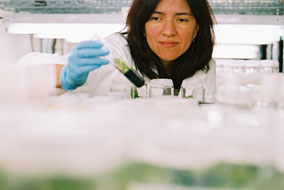
M.Sc. Plant Science student Faride Unda with Exacum samples - photo by Martin Dee UBC Reports | Vol. 51 | No. 9 | Sep. 7, 2005
Introducing the Faculty of Land & Food Systems
By Ai Lin Choo
Imagine sailing across the South Pacific aboard a cruise ship while gaining academic credit towards a Bachelor of Science degree at the same time.
That’s exactly what fourth-year Global Resource Systems student Jordan Marr did, and he didn’t have to pull any strings to convince anyone.
Last year, Marr was selected as one of 12 Canadian participants in the prestigious Ship for World Youth (SWY), a unique international cultural exchange program organized by the government of Japan. The program brings together over 200 youths from around the world to learn about international cooperation and understanding, as well as to foster cultural sensitivity and friendship.
“It does sound like all play, but the trip allowed me to gather with people from all over the world and discuss environmental and sustainability issues in a cross-cultural setting,” Marr explains. “There were courses offered on board and round-table discussion groups that were focused on a variety of subjects.”
What excited Marr most about the experience was learning about and meeting different people from all over the world. It didn’t hurt that his participation was encouraged by his faculty, and almost necessary in order to graduate.
As part of the Global Resource Systems program, students have to complete an international experience requirement that can take the form of an academic exchange, field study or internship.
Offered by the Faculty of Land and Food Systems (formerly Agricultural Sciences), the program combines a field of study such as international development or sustainable agriculture within a specific region of the world, and combines language skills, cultural experience and real-life applications of global sustainability.
This five-year-old program and students like Marr embody the changing face of the newly named faculty.
Murray Isman, the faculty’s Dean pro tem, explains that as global links between countries, people, animals and shared natural environments intensify, the need for interdisciplinary, collaborative and systems-based research at universities has increased as well.
“The change from Agricultural Sciences to Land and Food Systems exemplifies the diversity of our faculty in a world more concerned about the interconnectedness of our land, food, water, health and environment,” he says.
“It also illustrates how the overlap of disciplines actively work to provide the education, research and knowledge necessary to ensure the sustainable production of healthy food and the responsible use of natural resources.”
The change in title is also part of a larger international trend to tackle misperceptions associated with the word agriculture as being primarily farming-related.
While the faculty still maintains its agricultural roots, it was clear from surveys that the name was not encompassing enough to represent its diversity -- especially when it came to potential students.
UBC is the third agricultural faculty in Canada to achieve a similar change in image, and follows the lead of numerous schools in Australia and the United States.
Pedagogical changes now include an increasing focus on student-centred learning and practical work experience, and the faculty is also transforming its role at the new UBC Okanagan campus with plans to expand its agroecology program to the school in the near future.
“Our faculty’s role is to tackle the fundamental issues of safe, healthy and sustainable land and food resources. These are the most basic building blocks in society and subjects everyone can relate to,” says Isman.
As one of UBC’s three founding faculties, Land and Food Systems has had a long record of achievement on campus.
The UBC Faculty of Agriculture, as it was until it changed to Agricultural Sciences in 1969, in the early days engaged in research and education in plant, animal and food related topics including swine, poultry, dairy, and a range of crops.
And while the faculty still tackles issues concerning the production of healthy and sustainable food, the emphasis has shifted to encouraging students to approach broader and integrated issues of sustainable land and food systems across international lines.
Marr says he was excited by the interdisciplinary opportunities the faculty presented.
“The greatest benefit I think is connecting with people from a variety of backgrounds and disciplines and learning about various cultures and places,” he explains.
“I do feel fortunate to be in the program. Living in the city, you often forget about basic societal issues such as where food comes from,” he says. “The program has really given me a sense of that and has shown me that what affects one person, will likely affect the next as well, not just here, but also across borders.”
For more information, please visit: www.landfood.ubc.ca.
The recent merger of three programs at the School of Architecture and Landscape Architecture will make way for new joint and interdisciplinary programs, and research opportunities this fall.
UBC’s Environmental Design and Landscape Architecture programs joined The School of Architecture in July 2005, and the school will now offer four graduate degrees and one undergraduate degree.
“Landscape architecture is constantly evolving to create healthy, evocative places in complex environments,” says Cynthia Girling, Landscape Architecture Program Director.
“Aligning with architecture, our sister professional program, is long overdue and will provide students and faculty with numerous new opportunities.”
The Landscape Architecture program was previously administered by the Faculty of Agricultural Sciences (recently re-named the Faculty of Land and Food Systems).
The expanded School of Architecture and Landscape Architecture will continue to operate as a distinct, focused professional and research unit within the Faculty of Applied Science. |
|
